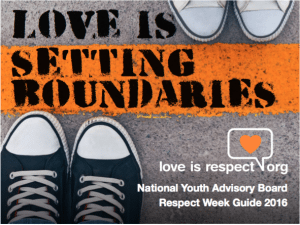Image from Love is Respect
All of us have been in situations that made us feel slightly uncomfortable, or like we should say yes when we don’t want to. You won’t always agree with everyone around you, and you won’t always want the same things they want – and guess what? That’s a great thing. It means you’re a human being with your own thoughts and desires, which is something to cherish.
But, often, because we are frequently told that being polite is more important than listening to our wants and needs, we think saying no isn’t an option, or we say it lightly, sugarcoating our “no.” Sometimes we try to say “no,” and others hear it as a suggestion, something they can take or leave.
In all kinds of relationships — with your partners, your friends, your parents, your teachers, your boss — learning that you have the right to say no, and learning how to say no, is extremely important for your well being. It’s also the basis of a healthy, communicative relationship.
Here are some essential foundations for creating healthy, nurturing relationships that build us up instead of putting us down.
Communication.
You should always feel comfortable speaking up with your partner. Communication is the foundation of a healthy, nurturing relationship.
Speak up about anything and everything. If your partner or friend wants to go see a movie, but you’re not interested in seeing it, tell them! Suggest another movie or another activity altogether.
If you don’t like the way your partner is touching you or don’t feel ready to get physical with them, say so. And if you’re interested in getting physical, just not yet, let them know. There’s no rush, and it’s important to listen to yourself and your body to know what you like and don’t like, especially when something makes you feel uncomfortable. Be mindful, too, of what your partner is comfortable with, and what they react negatively to or tell you they aren’t ready for. Make sure you’ve both created a space in which you can tell each other what you’re feeling, wanting or not wanting. Communication is a two-way street.
Someone worth keeping around won’t begrudge you for speaking your mind. A good partner, friend, or any other important person in your life is going to be grateful and eager to listen.
Respect.
Respect is the core of a healthy relationship. Your partner should want to know your likes and dislikes, and should respect the boundaries you set.
If someone tries to persuade you or move your boundaries around, that’s disrespectful to your needs and desires, and it’s a sign that your best interests or wellbeing are not their priorities. It’s also a sign they’re looking for control or power, which can signal an unhealthy and even abusive relationship. If you say you just want to make out, but they’re trying to push on to other things, be vocal about your boundaries, leave the situation, or call for help.
Just by existing, you deserve respect and deserve to have your wants and needs heard. Make sure your partner is listening, and make sure to listen to respect their likes and dislikes, too.*
*Note: if your partner’s wants and needs make you uncomfortable, you do not need to grant them. Listen to yourself first.
Support.
Support and respect go hand in hand: if you and your partner respect each other, you will both support each other’s wishes and boundaries, and encourage each other to keep those boundaries.
Support also means celebrating what makes your partner so great: their hobbies, their quirks, the food they like and shows they watch. Your partner should celebrate the things that make you, you, and support your investment in those things.
It also means supporting your decisions, your opinions (even if they don’t agree), and your boundaries. As mentioned before, a healthy relationship doesn’t include bartering or bargaining for a change in boundaries. When you say “no” or “not yet,” that’s a hard line, not something to be argued or challenged. Your partner should support your choices and meet you where you are. Sometimes, this might mean compromise — meeting each other halfway. But a compromise should never, ever make you feel bad, uncomfortable, or scared. If it doesn’t feel right, it’s not for you.
Healthy relationships help both people grow: you and your partner should lift each other up, not bring each other down.
Remember, healthy boundaries:
- Don’t impact your relationships with your friends and family. If your partner doesn’t like you spending time with certain people, or wants you to ask permission first, that isn’t healthy. You are your own person, and should have the space and freedom to function separately from your partner, without them getting jealous or angry. Your partner should support these relationships.
- Don’t affect your hobbies and activities. While a relationship with someone will take extra time and might mean moving your schedule around if you’re a busy person, it doesn’t mean giving up the things you love doing. If your partner asks you to give up your activities, it’s a sign they’re looking for control or power, which is a red flag for an abusive relationship.
- Don’t require you to share everything. Phone passwords and social media or email logins are not offerings of trust so your partner can feel closer to you. This is another sign your partner wants to control and patrol your life outside of them — you should have a world separate from them, and they should trust you and feel comfortable and secure with that.
People can only change if they want to. If someone’s wants and needs don’t match up with your wants and needs, that’s okay, and it doesn’t mean either of you has to change or push yourself to fit the other’s expectations. It might be time to move on from the relationship.
Reach out. Make sure you have a support system — friends, family, counselors — you can turn to. You are never alone, and you shouldn’t feel like your partner is the only person in your life. Make sure you have contact with people outside of your relationship. If you aren’t sure who those people are, but need advice or help, there are plenty of resources for you. Love is Respect is a great site to find any information you need on dating and sex, and they’re available 24/7 to answer your questions or just chat.



